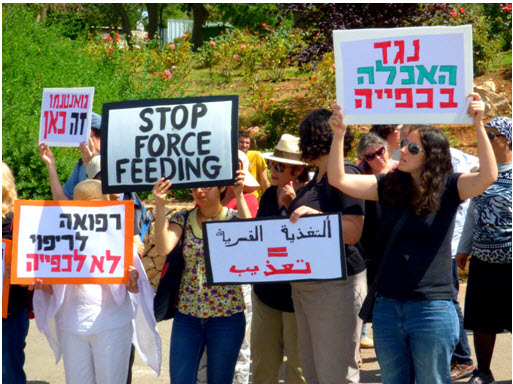The Israeli Knesset voted Thursday, July 30, to allow the force-feeding of prisoners conducting hunger strikes. In recent years, Palestinian prisoners have staged a series of hunger strikes, often leading to their hospitalization and waves of protests in the occupied West Bank. The association of Israeli physicians said in a statement issued later on Thursday that it will file a petition with the Supreme Court, demanding that the law be rescinded. The Israeli Medical Association (IMA) condemned the law, calling force-feeding a form of torture, an assessment shared by leading medical associations around the world. “It’s absolutely clear that it’s torture, and it is long-lasting torture,” IMA Chairman Dr. Leonid Eidelman, added. “It cannot be done without endangering the patient and causing him extreme suffering.”

Protesters demonstrate against forced feeding of Palestinian prisoners, Jerusalem, June 16, 2014. Activists and doctors took part in a demonstration in front of the Knesset, organized by Physicians for Human Rights, against the bill to legalize forced feeding of hunger-striking prisoners in Israel. (Photo: Physicians for Human Rights)
While the law does not specifically mention Palestinians, the Minister for Internal Security, Gilad Erdan, who sponsored the legislation, said it was necessary since “hunger strikes of terrorists in prisons have become a means of threatening Israel.” The opposition Joint List has gone on record saying the law legalizes the torture of Palestinian prisoners. “They [the authorities] don’t want to protect the lives of prisoners,” said communist MK Dov Khenin (Joint List), who called the law “brutal and dangerous… In the State of Israel no prisoner has ever died from conducting a hunger strike; however, four prisoners who were force-fed have died… This is a murderous law which sanctions doing to prisoners things which are forbidden by international norms.”
While the law applies to all prisoners held in Israeli jails, Palestinian prisoners in particular have used hunger strikes as a tool to draw attention to their detention. Israel has been known to accede to the requests of the striking prisoners in the past, including early release. A member of the Palestinian militant group Islamic Jihad, Khader Adnan, has been arrested several times and held without charge, and in response has staged to date two lengthy hunger strikes to protest his administrative detention, both of which nearly caused his death.
In the case of the US force-feeding of detainees imprisoned at the American facility at Guantanamo Bay, the UN has described force-feeding as “a breach of worldwide law” and has noted that hunger strikes are to a large degree caused by the legal limbo in which protesters are held, leaving them with no certainty of their fates.
A number of Israeli human rights organizations have made a joint statement against the new legislation. The signatories to this statement include Adalah, Amnesty International – Israel, the Association for Civil Rights in Israel, B’Tselem – the Israeli Information Center for Human Rights in the Occupied Territories, Gisha – the Legal Center for Freedom of Movement, HaMoked – the Center for the Defense of the Individual, the Hotline for Refugees and Migrants, Physicians for Human Rights – Israel, the Public Committee Against Torture in Israel and Yesh Din – Volunteers for Human Rights. Their statement says: “The government of Israel has other options for addressing the demands put forward by hunger strikers – including demands to revoke administrative detention orders, lift bans on family visits, or significantly improve quality and accessibility of medical care. Instead, the government has chosen to respond by urging and inducing doctors to commit a grievous ethical offense.” Furthermore, according to these human rights organizations “force-feeding hunger strikers is both morally and medico-ethically wrong. This bill, in patent defiance of international conventions and declarations, legalizes a practice that is considered a form of torture. It does not aim to save the lives of prisoners, but to crush their spirit. To date, not a single hunger striker has died in Israel as a result of a hunger strike, yet four have died of force-feeding related complications.”
Related:
- Communist Party of Israel: No to administrative detention
- 18 Human Rights organizations against forced feeding of Palestinian prisoners
- MK Khenin: Force-feeding is torture
- Israeli Doctors Come Out against Bill to Force-Feed Palestinian Prisoners
- A Palestinian hunger striker on administrative detention is in danger of dying
- Palestinian prisoners begin hunger strike
- MK Muhammad Barakeh visited Palestinian prisoner Khader Adnan
- Palestinian Hunger Striker Khader Adnan’s Health Rapidly Worsens after 50 Days without Food


